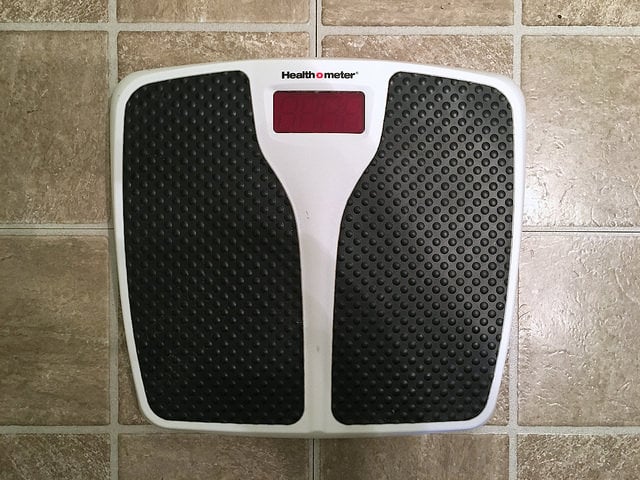
by Ecoziva (Brazil) | Aug 26, 2016 | Body Image, Brazil, Food, Girls, Motherhood, South America, The Americas, Uncategorized, World Motherhood
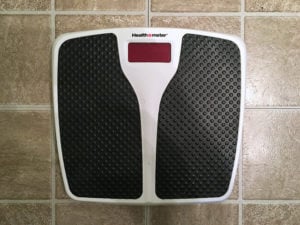 I want to start out by saying that this is not some sort of fat shaming post – much to the contrary.
I want to start out by saying that this is not some sort of fat shaming post – much to the contrary.
Not many years ago I weighed 67 kg (about 147 lbs.) – what is considered to be the “ideal” weight for my height. Now I weigh 105 kg (231 lbs.). Yes, my weight fluctuated back and forth over the years, but I had never weighed so much, not even during my pregnancies.
In fact, people often ask whether my weight gain had anything to do with my pregnancies. “No”, I answer, “I began gaining more weight after my youngest child turned one”. “So what happened?” is often the next question.
Having been the slave of an eating disorder for a long 26 years, I have a lot of answers for that one. Analyzing the motives behind my overeating and binging episodes took up a great portion of my life when I was trying to cure myself, but that is the theme of a sequel to this post.
The fact is, my gaining weight, now that I look back, was actually an important step in rethinking my relationship with food and with my own body.
What I wanted to share today was a handful of things I learned after gaining close to 40 kg (over 80 lbs).
It did take a while for people to notice and start to comment. After all, I am a very tall, big boned woman who likes to wear loose, comfy clothing. But after a certain point people started to comment. A lot.
“What is happening? Have you been to a doctor?”
“You have to work on your self-esteem!”
“Are you pregnant again?”
“Are you absolutely sure you’re not pregnant?”
“You need to try this recipe/diet/exercise program.”
“You need to take care of yourself!”
“Be careful, your husband might start cheating on you if you don’t get your act together!”
And on and on and on…
Most people meant well, especially close friends and family. However, I would stare at the mirror and think I didn’t look that bad. No, I didn’t like having a protuberant tummy for the first non-pregnant time in my life (nothing against tummies, but I have always been more pear shaped). But other than that I thought I looked quite good. Medically I am fine too – after looking at the results of a whopping 26 tests, my doctor said my blood work could have been that of a 15-year-old.
However, other stuff does bother me a lot, the first being the assumptions people started to make, well-meaning or not. Many assume that being fat means you have health issues or very low self-esteem.
Another annoyance is trying to find clothes. For most of my life – even when I was skinny – I have had trouble finding clothes (and shoes!) that fit me, as I am a tall and big boned woman in a region where most ladies are not this large. Now it is so much worse and soooooooo much more expensive, which always feels like I am being punished for some reason.
At some point I began to read about the different movements that have been sparking up around the globe to celebrate women of any size and shape (men too, but there is just so much more pressure on women). I discovered that among all of the studies linking body fat to health issues, there are several that have not found such a clear link. But these are not given nearly as much attention by the media.
All in all, health and body size is a very personal issue that is linked to a huge number of variables. There are also studies that have linked dieting patterns to eating disorders, and teenage girls are at the greatest risk.
So, in the midst of all this, what are the dangers of being a fat mother?
To me the greatest dangers of being a fat mother are forgetting to love my body no matter what, trying to change it to conform to the world’s standards, and obsessing over weight-related issues instead of truly enjoying my life.
I want my children, and my daughter especially, to know that they are worthy of love regardless of what their bodies might look like, and I must model that example as best as possible.
I said this would not be a fat shaming post, but it is not advocating fat either. It is advocating joy, self-love and happiness, no matter what size, shape or state your body is. People (me included, for a long time) tend to think that if you love your body as it is you won’t have the motivation to change. Now I see that not loving my body regardless of anything else only makes things worse, and for a long time only made me want to eat more. Also, for a long time I thought avoiding my body (as in avoiding the mirror) was a good enough substitute for loving it.
There is so much more to say, but for now that is a small piece of my story with my body.
And you? How do you relate to your body? Tell us your story in the comments!
This is an original post to World Moms Network by Eco Ziva of Brazil. Photo credit: Alan Levine. This picture has a creative commons attribution license.
Eco, from the greek oikos means home; Ziva has many meanings and roots, including Hebrew (brilliance, light), Slovenian (goddess of life) and Sanskrit (blessing). In Brazil, where EcoZiva has lived for most of her life, giving birth is often termed “giving the light”; thus, she thought, a mother is “home to light” during the nine months of pregnancy, and so the penname EcoZiva came to be for World Moms Blog.
Born in the USA in a multi-ethnic extended family, EcoZiva is married and the mother of two boys (aged 12 and three) and a five-year-old girl and a three yearboy. She is trained as a biologist and presently an university researcher/professor, but also a volunteer at the local environmental movement.
More Posts

by Karyn Wills | Aug 24, 2016 | Motherhood, New Zealand, Parenting, Uncategorized
It was a very short time ago that I was seven years old imagining that 10 was very grown-up and close to being a teenager, and the Millennium was so far in the future that my head hurt to think about it. Yesterday, or thereabouts, I was 19 recovering from a minor relationship breakup, wondering whether I’d find someone to marry and trying to imagine what it would be like to be a person’s Mum.
Today I am 48 and alone again. I get to be the parent of three incredible human beings and I, pretty much, get to do everything that comes with that. And I’ve never been happier.
I get to get up in the night with my youngest who needs to go to the loo and anyone who has a nightmare or wants a hug. I get calls at random hours to go look at the stars or the moon – “Look I got you a duvet, Mum. Come join me.” It’s not entirely beyond the consciousness of these mini-mes that I am up at 4.50am week days. They know I am also being woken by hot-flushes. They have seen me have sudden moments of realization that the cat isn’t able to get to the litter-box, if I don’t get up immediately and open the door to the garage. They know I suddenly rush about organizing something, right now, right this second before I forget. But they don’t realize I also do all this at 3.00am or 2.10am or 12.55am.
I haven’t read a fiction book for myself for years, though I used to read one a day at times. I rarely exercise, or clothes shop, or get my haircut.
I work where I can laugh and sometimes get real, adult conversation. After work there are the countless errands of groceries or pharmacy visits or book stores or stationers, maybe if I’m lucky catching up with friends. There’s people to call when organizing four lives, the washing to get in and a house to be kept if not clean, at least hygienic. There’s meals to prepare most nights and children to teach how to prepare them on other nights. There’s homework and school meetings and fundraising and parent-teacher interviews to be a part of. And when I get home at night after I’ve been at a school meeting, if the dishes aren’t done it’s my job to at least wash them, and meat to get out of the freezer for the next night’s dinner.
There’s food scraps to be buried and a garden that really needs to be weeded. There’s children to be taught how to organize themselves and supervised to do so, once that’s learned. There’s chores to supervise or check are completed. There’s a cat to be fed and watered.
It’s all on me to get the car to the garage for servicing or repairs. If the house breaks, it’s my responsibility to get it fixed and to pay for those bills. The doctors visits are mine. The dentists visits are mine. The trips to the recycling depot and the dump are all mine. No one changes a light-bulb without me asking it to be done. Sometimes, things have to be ignored, at least temporarily for six months or so. It never ends.
And, it’s true, I’ve never been happier.
I know who I am and I am more likely now to call people on their b.s. that I ever have been before. I adore my house, live minutes from shops and an easy drive to the ocean, and can’t imagine living anywhere else. I have work I love and friends I think are just wonderful. I get out enough with just grown-ups. I have support I could call on, if I really have to. My boys are fabulous when consciousness over-rides testosterone, which is most of the time. And we laugh together hard. And often.
This week my house is an utter mess, my car needs to be taken to the garage, I was in bed at 7.45pm on Monday after 5 and a half hours sleep on Sunday night, I have paperwork that should have been finished a week ago, the cat has a dodgy tummy and my it was my youngest’s turn to become seven.
And, it’s absolutely true:
I’ve never been happier.
Karyn is a teacher, writer and solo mother to three sons. She lives in the sunny wine region of Hawke’s Bay, New Zealand in the city of Napier.
More Posts
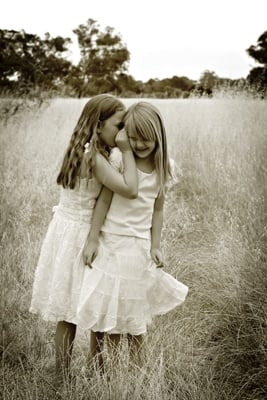
by Katinka | Jul 25, 2016 | 2016, Belgium, Childhood, Europe, Life Lesson, Motherhood, Parenting, Siblings
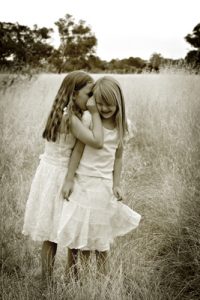 Secrets. I believe they’re important. Especially for children.
Secrets. I believe they’re important. Especially for children.
When I think about adults with secrets, I mostly imagine sadness, nasty stuff or crime. Mostly sadness though. Actually, I don’t even know if I have big or little secrets myself. Probably not. I’ll have to think about it.
But a child with a secret, I absolutely love that. It’s touching and a little bit nostalgic. It makes me think about the candy I once hid under our beech tree, savouring one every once in a while, including the black sand it was buried in. My secret treasure…
My two children, they share a secret. The youngest however, age 7, is absolutely terrible at keeping secrets. At Mother’s Day, she has never made anything, especially not for me, and I shouldn’t go looking behind the couch at all. Oh, and it doesn’t have hearts all over it. That kind of terrible. She just adores sharing inside knowledge. And now she has to keep a secret.
Yesterday, she almost told me, while we were driving home from school. It was a school secret, completely fresh and just begging to be shared with the world. Or at least with me. Her big brother was just in time to keep her from giving it away.
When we got home, she whispered she would tell me later, when her brother was not there. Now that was quite a difficult parenting moment for me.
You need to know that I am a terribly curious person. It makes me who I am. I could never be a mail woman. All those closed letters, never knowing what is inside, what the story is behind that stamp, whether it is good news or not: my fingers would itch all the time. At least as a scientist, I can give in to that natural curiosity and the urge to reveal secrets.
That day, I had to grit my teeth and be a mother, not a scientist. I told her she was not allowed to tell me their secret. I explained to her that it is important for siblings to have little secrets, so they learn to trust each other. I did tell her she could tell me the secret if it was about something dangerous or something which didn’t feel right to her.
I ended my little speech by telling her I didn’t want to know their little secret anyway.
She didn’t believe that last bit. This daughter of mine is less naive than I am.
But she did walk away without spilling the secret. I’m not sure which one of us had the hardest time at that.
It has been five weeks and I still don’t know what it was about.
It’s killing me.
How do you feel about your children keeping secrets? Do you think it is important for them or do you fear they will also keep less innocent secrets when they grow up?
This is an original post to World Moms Network by K10K. Photo credit: Lisa M Photography. This picture has a creative commons attribution license.
If you ask her about her daytime job, Katinka will tell you all about the challenge of studying the fate of radioactive substances in the deep subsurface. Her most demanding and rewarding job however is raising four kids together with five other parents, each with their own quirks, wishes and (dis)abilities. As parenting and especially co-parenting involves a lot of letting go, she finds herself singing the theme song to Frozen over and over again, even when the kids are not even there...
More Posts

by Ecoziva (Brazil) | Jul 22, 2016 | 2016, Brazil, Motherhood, South America, The Americas, World Motherhood
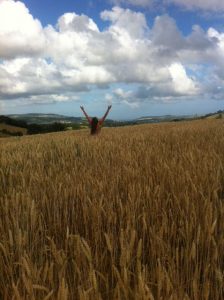 A part of me wants a fun, carefree life
A part of me wants a fun, carefree life
A part of me says, not possible anymore
A part of me says it’s because of the kids
A part of me says there were excuses before
A part of me wants my body of so many years ago
A part of me says it’s possible no more
A part of me says I didn’t like it anyway
A part of me says, time to start loving it evermore
A part of me wants a successful career
A part of me says it matters no more
A part of me says it’s just my livelihood
A part of me says, I’ll soon miss the toys on the floor
A part of me wants to follow my dreams
A part of me says, I remember no more
A part of me wants to throw everything up in the air
A part of me says it’s all an inner war
What inner conflicts do you face as a mother?
This is an original post to World Moms Blog by Ecoziva of Brazil. Photo credit: Ian Burt. This picture has a creative commons attribution license.
Eco, from the greek oikos means home; Ziva has many meanings and roots, including Hebrew (brilliance, light), Slovenian (goddess of life) and Sanskrit (blessing). In Brazil, where EcoZiva has lived for most of her life, giving birth is often termed “giving the light”; thus, she thought, a mother is “home to light” during the nine months of pregnancy, and so the penname EcoZiva came to be for World Moms Blog.
Born in the USA in a multi-ethnic extended family, EcoZiva is married and the mother of two boys (aged 12 and three) and a five-year-old girl and a three yearboy. She is trained as a biologist and presently an university researcher/professor, but also a volunteer at the local environmental movement.
More Posts

by Marie Kléber | Jul 11, 2016 | France, Life, Motherhood, Parenting
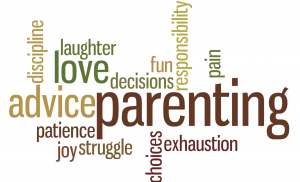
Source: http://www.corr.us/services/parenting-resources
Last weekend I was away visiting some friends in the South of France. While we were talking about how hard it can be to raise kids, we realized that whatever we do, we’ll always have to face criticism, whether it is from family members, friends with kids or other parents around. People have an idea about everything. And when it comes to parenting or motherhood, they think that they must share what they think about this or that. Without even being asked to do so.
When it happens, we tend to feel like we are the worst mums ever. We’re not doing things the way we should do them. Others seem to know better. It’s very easy to get depressed, to cry and go straight to the first doctor we know to empty our hearts full of negativity and stress.
What if the others weren’t wrong, just different?
We all have our ideas on how we wish to raise our kids, what values we wish to pass on to them, on how well it feels for us to deliver a specific message. There are no rules, except the ones everybody knows, that say we have to take care of our kids and respect their needs, respect who they are and help them grow. The way we do it belongs to us. And most of the time we do the best we can with what we have, what we have been taught, what we have learnt on the way – what we feel inside our hearts.
In France nowadays we hear a lot about attachment parenting (éducation bienveillante). The idea is brilliant. But in reality, it’s not THAT easy to put into place. For some parents it’s fine and it works perfectly with their kids, for others it does not fit in their world. They can try for hours and days, without seeing any results. Does this mean they are bad parents? Does this mean others have the right to judge them and put a red sticker on their faces?
I don’t think so.
At the end of the day, we want the same thing: to raise happy, healthy and confident children. In order to do so, I think we ought to help each other and accept that one approach is not better than another one. When asked, we can share our ideas. When not, why create more mess in the head of parents who already feel overwhelmed by the task at hand?
How do you welcome negative criticism about the way you are raising your kids?
This is an original post for World Moms Network written by Marie Kleber in France.
Marie is from France and is living near Paris, after spending 6 years in Irlande. She is a single mum of one, sharing her time between work, family life and writing, her passion. She already wrote 6 books in her native langage.
She loves reading, photography, meeting friends and sharing life experiences. She blogs about domestic abuse, parenting and poetry @https://mahshiandmarshmallow.wordpress.com
More Posts - Website
by Aisha Yesufu | Jul 7, 2016 | 2016, Africa, Africa and Middle East, Communication, Education, Family, Motherhood, Nigeria, Priorities, School, Study Abroad, Travel, World Motherhood
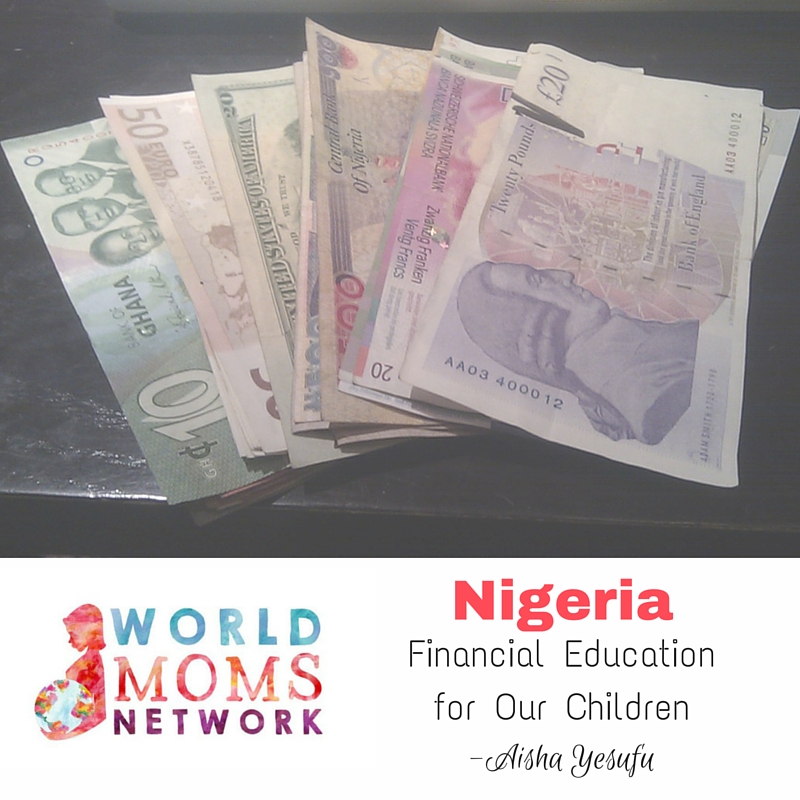
“Mummy, is it Buhari’s fault that the economy is bad?” My daughter asked me this when she returned from school one day. She’s referring to Muhammadu Buhari, the president of Nigeria. “You must always call him President Buhari,” I corrected my daughter. Then I realised this was another opportunity to educate my daughter about economy and finances.
I told her it’s not President Buhari’s fault that the economy is bad, rather it is the choices we made as a country. I told her Nigeria is like a big family. Imagine that the father had a big job and they paid him a very good salary. In this family, perhaps the mother chose not to work because the father’s salary was so good. The family lived well, and often traveled abroad for holidays, wearing designer clothes. Everything they did was expensive. They had huge parties all the time. Their children went to expensive schools and they go abroad for treatment even for a simple headache.
The father earned well, but did not save anything and sometimes borrowed even more money to maintain their extravagant lifestyle. At one time some family members started stealing the money for their own personal enjoyment. They stole this money right out of the family account.
One day the company the father worked for was no longer able pay the father his big salary, so they gave him a pay cut. Remember, the father did not save when he was earning a high income. Remember, the family led a very expensive lifestyle. Remember, the mother had no job, so she couldn’t support the family. So, there was problem.
Eventually, a new father was brought in and the salary was reduced further and further. The family still had no savings and money was still being stolen from the family account. The new father found it difficult to support that expensive lifestyle the family was accustomed to. In this case, there would be economic problems and it wouldn’t necessarily be the father’s fault. In the meantime, the father must still deal with the people who stole from the family account, and try to recover the money.
“Do you understand now?” I asked. “Yes, I do,” said my daughter, and she went away, satisfied.
Our children know something is wrong and we need to explain to them what is going on. At a school meeting recently, I overheard a parent wondering how can she tell her child they can’t afford to pay school fees? I told them as parents you need to financially educate your children. This is not done in school, so it’s the parent’s duty to ensure that children are aware of economy and finances.
My children are part of our family’s economic life. They know what’s going on in our businesses and their father’s job. They know when things are good that we are investing, and they know why we invest. They know where the money for their school fees is coming from and what sacrifices were made to make ends meet. When business is bad, they know. At one time I thought we couldn’t pay my daughter’s school fees and I told her she had to delay a week or more before starting school (we always pay school fees before resumption date. It’s my personal stand). Luckily we managed to pay on time, but she learned that it’s a possibility and understands life sometimes throws a spanner into the works.
When we joined my husband in Abuja in 2011, my children’s school fees were fifty times higher than what we were used to paying. I had to sit my children down to explain that we needed to make sacrifices for their education. One of the decisions we made as a family was to reduce travelling abroad for holidays. So we did, and my children understood why.
In December, my daughter went to Europe for her school’s annual ski trip. She noted that there were a lot fewer students on the trip than previous years. My daughter also went to Wales this month for the Duke of Edinburgh expedition. Similarly, not all the students participating in the Duke of Edinburgh programme went for the expedition. I had to explain to her there was economic downturn and it was not easy for all families to afford such trips. At the moment, we are seriously worried about paying for education because our currency was losing value. She gave me a worried look and said, “God willing, everything will be okay.” “Amen,” I replied.
My daughter left the house a better-informed child. I hope that when she becomes an adult, she will be better prepared for economic and financial challenges because she learned about it as a child. As parents, we cannot shield our children from the reality of life. Let them learn from us and be more financially savvy.
How do you ensure that your children get a good understanding of your family finances?
This is an original post written for World Moms Blog by Aisha Yesufu in Nigeria.
Photo credit: Bob Ryskamp / Flickr

 I want to start out by saying that this is not some sort of fat shaming post – much to the contrary.
I want to start out by saying that this is not some sort of fat shaming post – much to the contrary.


 Secrets. I believe they’re important. Especially for children.
Secrets. I believe they’re important. Especially for children.
 A part of me wants a fun, carefree life
A part of me wants a fun, carefree life





